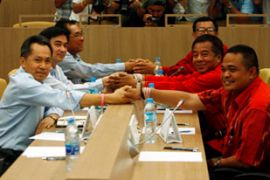Thai PM meets red shirt protesters
Abhisit holds talks with group calling for him to step down and call fresh elections.

Weng Tojirakarn, one of the red shirts representatives, said: “This is not likely to take long because the atmosphere is good. Everyone is acting in good faith for the benefit of the country.”
Abhisit arrived at the venue, a Bangkok educational institute, along with two of his senior staff, and shook hands with his red-clad opponents as they sat down at the meeting table.
Problem-solving
Al Jazeera’s Aela Callan, reporting from Bangkok, said: “Abhisit is using the opportunity to show off his debating skills and the red shirts have told their protesters to expect good news and that they will come out victorious.
“Veera [Musikapong], the red shirts leader, has been saying that they feel the same as Abhisit; that they don’t want to be negative, and don’t want to hurt anyone, but they do want to solve many of Thailand’s problems.
| in depth | |||||||||
|
“Both sides want to be seen as the ones who are being reasonable, but how long the more radical elements in the red shirts movement, and how long the more radical elements within the Thai military hold out is a big question.”
The prime minister’s concession to the about 80,000 red shirts gathered in the capital followed the news that four soldiers had been injured after grenades were thrown at an army barracks used by the government as a base during two weeks of protests.
“The blasts injured four soldiers,” Major-General Prawut Thavornsiri told the AFP news agency, adding that the incident took place in the early hours of the morning.
Prawut, from the police task force monitoring the protests, said the blasts occurred near the gate of the infantry barracks on the northern outskirts of Bangkok.
The explosions were the latest in a series of more than a dozen to hit government installations.
The red shirts, loyal to Thaksin Shinawatra, the former prime minister, began their demonstrations on March 12 and have vowed they will not leave until Abhisit calls fresh elections.
Abhisit’s government came to power with army backing in a 2008 parliamentary vote after a controversial court ruling removed allies of Shinawatra.
The protesters have said that they also aimed to put pressure on the military, which has mounted a heavy security response to the demonstrations.
‘Partial victory’
On Saturday, they forced soldiers across the capital to pull back from temporary postsset up to police the mass demonstrations over the previous weeks.
Nattakorn Devakula, a Thai political analyst, said the forthcoming talks with the protesters were a “a sign that [the red shirts] are gaining some ground”.
He said that if the prime minister is adamant about not dissolving parliament, a key demand by the protesters, then the red shirts cannot claim victory.
“It’s a partial victory so far,” Nattakorn said.
He added that it would be a “loss” for Abhisit to dissolve the house “simply because protesters are out on the streets”.
“Plus, I don’t think he [Abhisit] is ready to win more than the half [majority] that is needed to form a ruling coalition after the election,” Nattakorn said.
“The Democrats claim that they can win 240, if not 280, seats and if they’re really confident they can do that, then the prime minister is probably going to be willing to dissolve the house. But deep down he knows that he cannot win the majority just yet.”
Thailand has had several prime ministers since Thaksin was ousted in a coup in 2006.
Thaksin, who lives in exile to avoid a jail sentence for corruption, has regularly addressed his supporters via a videolink, raising the prospect of a campaign of civil disobedience if Abhisit continues to refuse demands to dissolve parliament.
